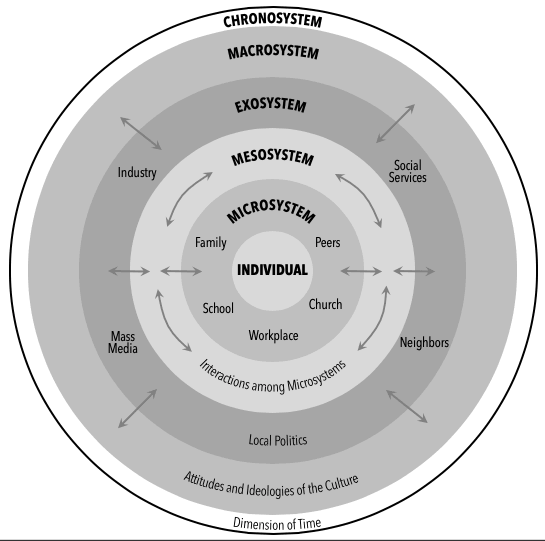AKA
Bioecological Systems Theory
Bronfenbrenner's Model
Development in Context
Ecological Framework for Human Development
Ecological Theory of Development
Ecosystemic Approach
Human Ecology Theory
Focus
Co-entangled systems contributing to individual’s developmentPrincipal Metaphors
- Knowledge is … sum of the dynamics across nested systems
- Knowing is … fitting
- Learner is … a developing biological-and-experiential being (individual with/in multiple social and cultural systems)
- Learning is … developing
- Teaching is … influencing
Originated
1970sSynopsis
Ecological Systems Theory sees the individual as a developing physical-and-psychological (i.e., biological-and-experiential) being who is nested in and who interacts with five levels of norm-guided, rule-imposing systems:
- Microsystem (Urie Bronfenbrenner. 1970s) – in Ecological Systems Theory, the immediate social connections of the child – most focused on the family, but including peers and other close relationships that have influence on the child’s development – including such as social groups (e.g., child’s peers), organizations (e.g., local clubs), and institutions (e.g., school system)
- Mesosystem (Urie Bronfenbrenner. 1970s) – in Ecological Systems Theory, the grander web of associations and possibilities that arise in the interactions systems comprising one’s Microsystem
- Exosystem (Urie Bronfenbrenner. 1970s) – in Ecological Systems Theory, the societal structures and systems that are typically perceived as the given backdrop of one’s existence (e.g., government, financial system, legal system, industrial system)
- Macrosystem (Urie Bronfenbrenner. 1970s) – in Ecological Systems Theory, the grander web of associations and possibilities that arise in the interactions systems comprising one’s Exosystem – including, for example, societal values and cultural traditions
- Chronosystem (Urie Bronfenbrenner. 1970s) – in Ecological Systems Theory, the cumulative influences of patterns of environmental, sociohistorical, and all other dynamical continuities over one’s lifetime
- Developmental Systems Approach (Developmental Contextual Model) – the notion that development involves the mutually specifying (i.e., affecting and being affected by) influences of biology and experience, spanning levels from the genetic to the cultural
- Family Systems Theory (Bowen Family Systems Theory; Bowen Theory; Family Systems Model) (Murray Bowen, 1960s) – an ecological model of relationships that was developed to inform family therapy. It emphasizes that the therapist must work with the family as a whole to develop systemic and sustainable patterns of thought and action.
- Transactional Model of Development (Arnold Sameroff, 1970s) – a model that frames human development in terms of bi-directional interplays (that is, of simultaneously influencing and being influenced by) the individual and the familial, community, societal and cultural context
Commentary
When it was first proposed, in an era dominated by cause–effect thinking, Ecological Systems Theory was greeted by many as provocative but not especially useful. As sensibilities and methodologies evolved over the subsequent 50 years, it was increasingly acknowledged as relevant and necessary, but has to a great extent fallen into the shadows of other Eco-Complexity Discourses.Authors and/or Prominent Influences
Urie BronfenbrennerStatus as a Theory of Learning
Ecological Systems Theory is a theory of learning, broadly understood. It was among the first Eco-Complexity Discourses to have a significant influence in educational theorizing and research.Status as a Theory of Teaching
Ecological Systems Theory is not a theory of teaching, but it does offer insight into the truly complex characters of teaching and formal education.Status as a Scientific Theory
While it took some decades to develop methodologies that fitted to the assumed complexity of Ecological Systems Theory, there is now substantial empirical evidence to warrant describing the perspective as a scientific theory.Subdiscourses:
- Chronosystem
- Developmental Systems Approach (Developmental Contextual Model)
- Exosystem
- Family Systems Theory (Bowen Family Systems Theory; Bowen Theory; Family Systems Model)
- Mesosystem
- Macrosystem
- Microsystem
- Transactional Model of Development
Map Location

Please cite this article as:
Davis, B., & Francis, K. (2023). “Ecological Systems Theory” in Discourses on Learning in Education. https://learningdiscourses.com.
⇦ Back to Map
⇦ Back to List
